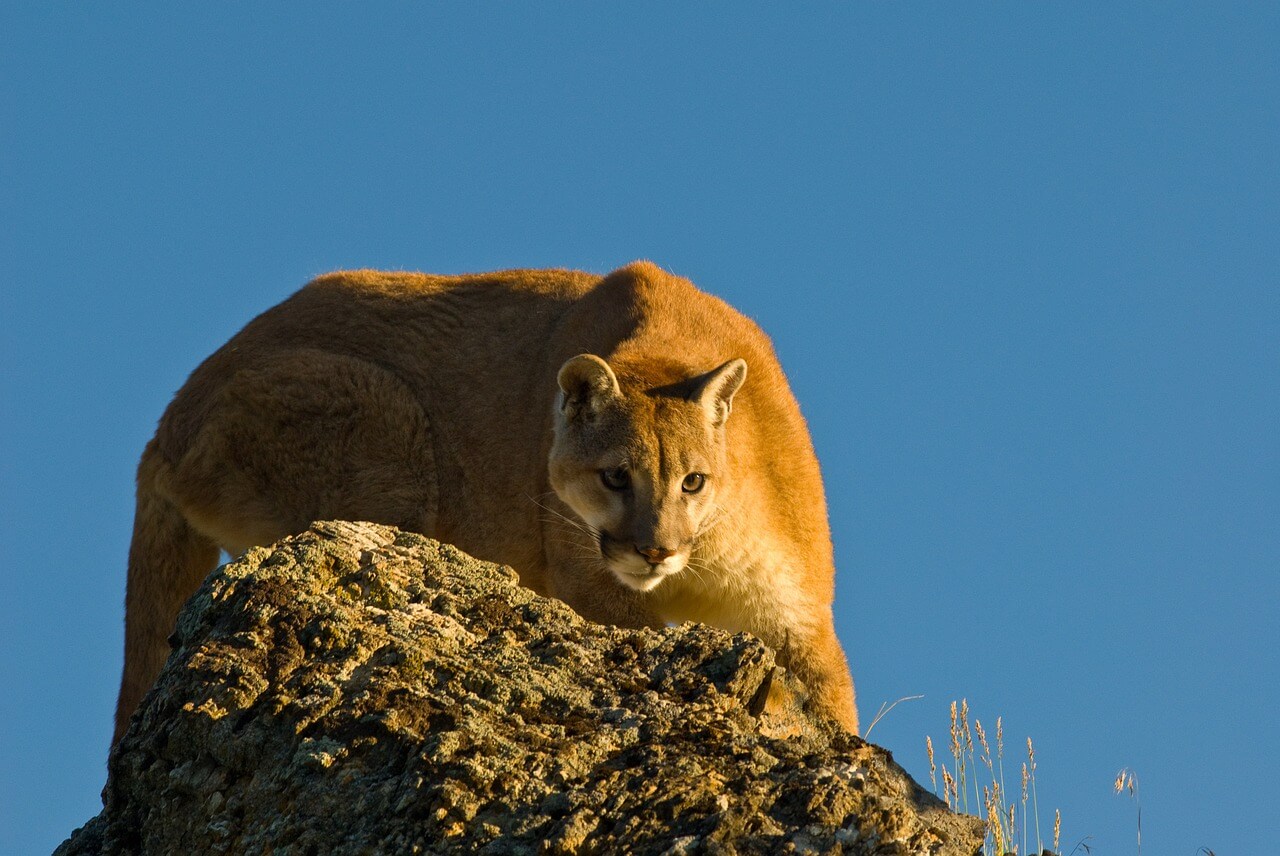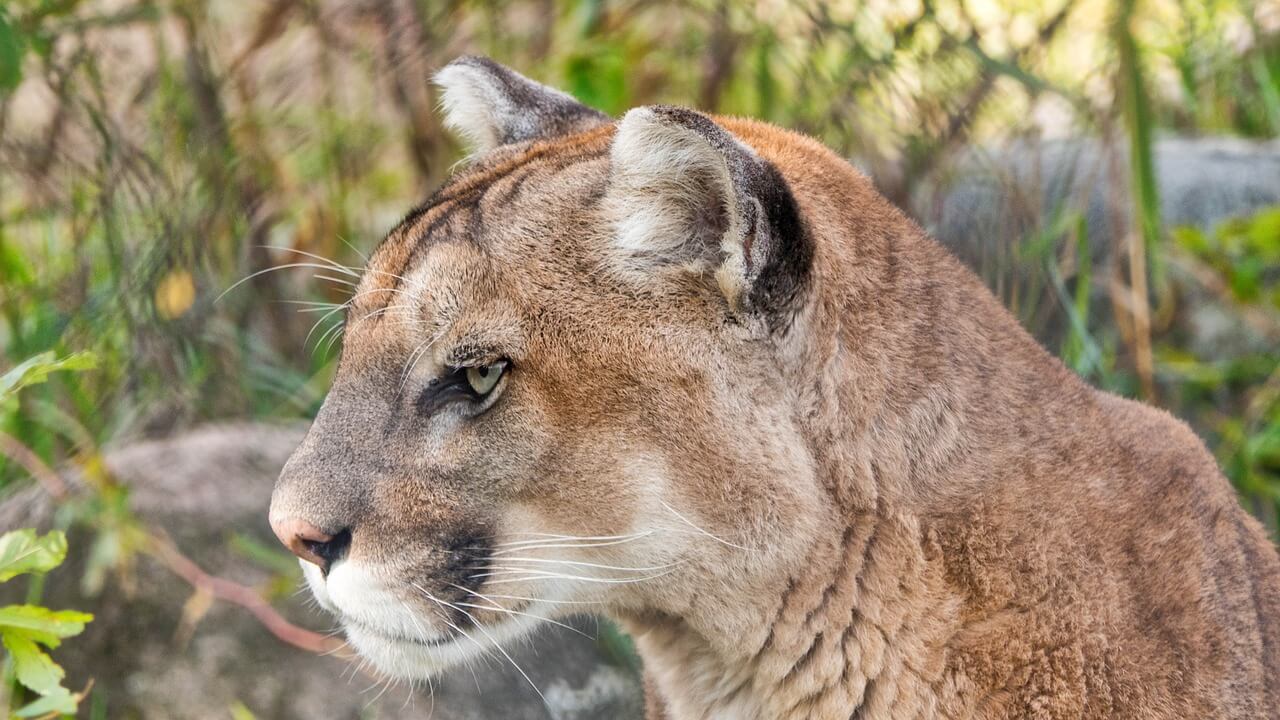You hear the names thrown around all the time. Cougars, pumas, panthers, mountain lions: what’s the difference between them? Are there any differences at all? And, if they’re all the same animal, why does this particular species of cat have so many different names? In this article, we’ll talk about the cougar – the cat of many names.
What You'll Learn Today
What’s the Difference Between Cougars, Pumas, and Mountain Lions?

The short answer is, there is no difference.
Cougars are well known for having many different names, and each of these names refers to the same species of large cat. “Puma” and “Mountain Lion” are some of the most common names for cougars.
This begs the question: where did these different names come from? How and where did they originate?
The name “cougar” is actually a cross between South American indigenous names for jaguar. The word was originally spelled “cuguar” and was later changed to the current spelling.
Despite essentially being named after the jaguar, cougars are a separate species from jaguars. The jaguar is the largest cat in the Americas, while the cougar is the second largest.
The name “puma” also got its start in South America, where it remains the most commonly used name for the cougar. “Puma” means “powerful animal” in the Peruvian language Quechua.
In fact, the scientific name of the cougar is Puma Concolor, a name that combines the Peruvian word with a Latin word meaning “of one color.”
The name “mountain lion” is commonly used throughout the western United States and Canada. It’s a popular nickname that has become more widely used over time, but the name is actually quite misleading.
Cougars are not related to lions, as they belong to the Puma genus. Actual lions belong to the Panthera genus.
Which leads us to the next question:
Are Cougars and Panthers the Same?
Sometimes cougars are referred to as panthers, but in fact, panthers belong to an entirely different genera. Cougars are in the puma species, while the term “panthers” refers to the panthera species.
“Panther” is basically a blanket term that can be applied to a variety of big cats found throughout the world, including jaguars, leopards, tigers, and lions. The same is true of black panthers – according to eMammal, a division of the Smithsonian Institute, the term “black panther” refers to darkly colored leopards and jaguars.
The exception to the species rule is the Florida panther. Found in a small region of the Florida panhandle, these so-called panthers are actually a member of the puma genus, making them a subspecies of cougar (and one that is actually endangered).
Check out the following video to learn more about Florida panthers.
So, aside from scientific classifications, what sets panthers (excluding Florida panthers) and cougars apart?
- Panthers can roar, while cougars cannot.
- Panthers generally have shorter lifespans than cougars.
- Panthers are found throughout the world, including Asia, Africa, and South America. Cougars are only found in North and South America.
Are Cougars Known By Any Other Names?
As mentioned above, cougars are cats of many names; but just how many names are they known by?
It’s impossible to say for sure when you take all languages into account. But in English alone, the cougar is or has been known by 40 different names.
In fact, the cougar holds a Guinness world record for having so many names. Some of the names cougars have been called include:
- Katalgar and Ko-Icto: Names given the cougar by different Native American tribes.
- Lions and tigers: Early European colonists and settlers would frequently but incorrectly refer to cougars as lions or tigers.
- Catamount: Other early settlers used this name or the similar “carcajou” to refer to cougars.
- Painter: A common colloquialism for panthers.
- Swamp screamer: Probably a nickname mostly given to Florida panthers and other cougar subspecies that live in wetter climates.
Why Do Cougars Have So Many Different Names?

Cougars are widely distributed throughout the Americas, particularly South America. They can be found from the northern parts of Canada to the southern parts of Argentina and Chile, so different regions have simply developed different names for the cats.
In addition, cougars were called different names by different groups of people as they settled the Americas. Some of those names have stuck, especially in specific regions.
Cougar names may also refer to slight genetic differences between subspecies. For example, Florida panther kittens have a spotted, jaguar-like appearance, so their name may suggest a similar appearance between this cougar subspecies and the panthera genus.
Though they have many names and are divided into various subspecies, cougars are surprisingly similar in appearance and genetics no matter where they are found in the world.
Conclusion
There is no difference between cougars, pumas, and mountain lions. They are all the same species, members of the puma concolor genus.
Panthers are members of the panthera genus, so they are not related to cougars. The subspecies of cougar known as the Florida panther is not actually a panther, as it is a member of the puma genus despite its common name.
Cougars are known by many different names, but they are all very similar in appearance and genetics.
Thank you for clearing up with accurate information. They’re all beautiful cats.
It is panthers in louisiana regardless of to what wildlife says. We have seen them. We know the difference between bobcats.
You’re literally missing the point. There is no singular big cat called a “panther” and that term refers to the panthera genus which consists of lions, tigers, jaguars, leopards and snow leopards. You’re seeing a cougar/mountain lion which is yes most definitely different then a bob cat however the term used to call them a panther is nothing but a regional thing that’s been done for a long time – nothing else and there’s nothing scientifically accurate about it. If you ever see a “panther” it is most definitely 100% of the time a different big cat because a panther is not a singular species. In fact, your cougar/mountain lion doesn’t even fall in the panthera genus so why it’s actually referred to as that is beyond me.
“Regardless of to what wildlife says” lol what are you even trying to say here? And congrats on knowing the difference between a cougar and a bobcat.. even tho no one said anything about a bobcat. I bet you believe vaccines are bad and election fraud is real
Vaccines are not as effective as natural acquired immunity. You have heard that statement described as “vaccines bad” which then gets made into ‘vaccine denier’ because you have been so thoroughly indoctrinated by those who insist that even those whose immunity is superior must still be vaccinated. That is antiscience- umless you are turning this into a political science discussion.
Otherwise you are no better informed than, and are morally equivalent to, those who deny the Holocaust. To deny that election fraud exists is to deny there is air. That actually makes your statement even more absurd and intellectually dishonest than anyone who have attempted to smear. That you would even include the reference makes you a spreader of propaganda and disinformation. Discussing the various genera and species associated with animal types in political terms puts you and your statement In that same category.
what? praytell does this have to do with cougars, pumas and bobcats? please try to stay focused.
Clearly you are suffering from
PLD, Pathetic Leftist Dementia, and are not able to see or comprehend the deep corruption that has completely infected most of the so- called Democrat Party.
If you truly think that the 2020 election of Dementia Joe was legitimate, your IQ can’t be much higher than your shoe size.
what? praytell does this have to do with cougars, pumas and bobcats? please try to stay focused.
I was taught in my youth that the Puma, Cougar and Mountain Lion were all the same cat – just different names in different locations in the Americas. In New England they were either called Mountain Lions or Catamounts. As a matter of fact, The Univ of Vermont calls their sports teams the Catamounts. What I didn’t know until reading this is that they are not actually lions. Lions are in the Panthera genus and Puma/ML/Cougar are in a separate genus called Puma. Hmmmmm.
As far as election fraud goes, it has been happening since the invention of the ballot box. To what degree? I have no idea. But, I find it very interesting that it was okay when the democrats were screaming election fraud in the ’16 election but when the Repubs did it in ’20, they were labelled kooks and what not. Hmmmm.
The Florida panther is not found regularly in the panhandle of Florida, might be one or two sighted there. The Florida panther population is found on the opposite side of Florida in south Florida and the Everglades. Their population is probably smaller than the Florida Panthers NHL organization (also found in South Florida near Ft. Lauderdale.
Good to know. Will move to the non-puma side of FL:) Thanks!
So silly was watching an episode of Rawhide with my husband and asked what is the difference between pumas. Cougars and mountain lions and found your site. Thank you for the education beyond my question including new information on the panther species and the misnamed Florida panther!
I had a pretty close relationship with a Bobcat in Louisiana using the old “Kitty, kitty” schtick. Wonder if that’d work with the big ones.
I saw my first puma while working at the military training centre in Meaford Ontaio Canada area. Such a beautiful impressive creature! Reported it to the Environmental Officer at the time.
interesting.
1986 at Saint Marks FL in the National Forest a panther/cougar walked across the road. It stopped and looked steadily at us for a few moments. He/she , it was NOT afraid of us. This area is just south of Tallahassee in the Panhandle. It was the highlight of our fishing trip.
This was a great article with interesting scientific facts.
But I still don’t know why older ladies who chase after younger gents are called “cougars”?!:D
This is such an intelligently written tutorial, clear, concise and complete, that clarifies what confuses almost everyone about the big cats. Worth committing to memory! I will be studying your other posts to continue to learn from you. Thank you for bringing knowledge to those of us looking to learn.
Well Said! I totally agree.